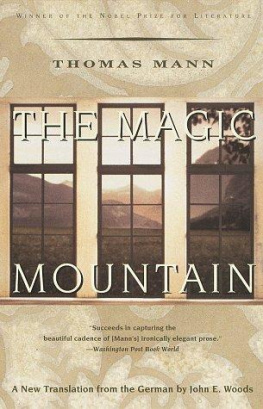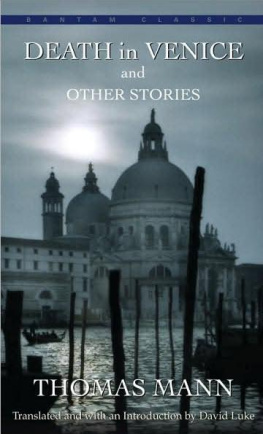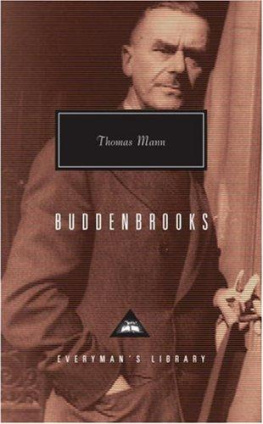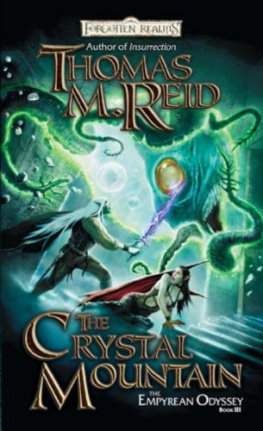Thomas Mann - The Magic Mountain
Here you can read online Thomas Mann - The Magic Mountain full text of the book (entire story) in english for free. Download pdf and epub, get meaning, cover and reviews about this ebook. year: 1969, publisher: Vintage Books, genre: Detective and thriller. Description of the work, (preface) as well as reviews are available. Best literature library LitArk.com created for fans of good reading and offers a wide selection of genres:
Romance novel
Science fiction
Adventure
Detective
Science
History
Home and family
Prose
Art
Politics
Computer
Non-fiction
Religion
Business
Children
Humor
Choose a favorite category and find really read worthwhile books. Enjoy immersion in the world of imagination, feel the emotions of the characters or learn something new for yourself, make an fascinating discovery.
- Book:The Magic Mountain
- Author:
- Publisher:Vintage Books
- Genre:
- Year:1969
- Rating:4 / 5
- Favourites:Add to favourites
- Your mark:
- 80
- 1
- 2
- 3
- 4
- 5
The Magic Mountain: summary, description and annotation
We offer to read an annotation, description, summary or preface (depends on what the author of the book "The Magic Mountain" wrote himself). If you haven't found the necessary information about the book — write in the comments, we will try to find it.
The Magic Mountain — read online for free the complete book (whole text) full work
Below is the text of the book, divided by pages. System saving the place of the last page read, allows you to conveniently read the book "The Magic Mountain" online for free, without having to search again every time where you left off. Put a bookmark, and you can go to the page where you finished reading at any time.
Font size:
Interval:
Bookmark:
Thomas Mann
THE
MOUNTAIN
[DER ZAUBERBERG]
Translated from the German by
H. T. LOWE-PORTER
A Division of R andom House
New York
VINTAGE BOOKS-EDITION, March 1969
Copyright 1927 by Alfred A. Knopf, Inc.
Copyright renewed 1955 by Alfred A. Knopf, Inc.
Copyright 1952 by Thomas Mann
All rights reserved under International and Pan-American
Copyright Conventions. Published in the United States
by Alfred A. Knopf, Inc., New York,
and Random House, Inc., New York.
Distributed in Canada by Random House of
Canada Limited, Toronto. By arrangement with
Alfred A. Knopf, Inc.
Originally issued as Der Zauberberg. Copyright, 1924, by
S. Fischer Verlag, Berlin. The authors note on The
Making of The Magic Mountain first appeared in The
Atlantic Monthly, January 1953.
Manufactured in the United States of America
Translators Note
The translator wishes to thank, in this place, a number of scholars, authorities in the various special fields entered by The Magic Mountain, without whose help the version in all humility here offered to English readers, lame as it is, must have been more lacking still. That they gave so generously is not to be interpreted otherwise than as a tribute to a work of genius. But with all their help, the great difficulty remained: the violet had to be cast into the crucible, the organic work of art to be remoulded in another tongue. Shelleys figure is perhaps not entirely apt here. Yet, since in the creative act word and thought are indivisible, the task was seen to be one before which artists would shrink and logical minds recoil.
But of the author of The Magic Mountain it can be said in a special sense that he has looked into the seeds of Time. It was in dispensable that we should read his book; intolerable that English readers should be barred from a work whose spirit, whatever its vehicle, is universal. It seemed better that an English version should be done ill than not done at all.
H. T. L.-P.
Contents
Foreword
THE STORY of Hans Castorp, which we would here set forth, not on his own
account, for in him the reader will make acquaintance with a simple-minded though pleasing young man, but for the sake of the story itself, which seems to us highly worth tellingthough it must needs be borne in mind, in Hans Castorps behalf, that it is his story, and not every story happens to everybodythis story, we say, belongs to the long ago; is already, so to speak, covered with historic mould, and
unquestionably to be presented in the tense best suited to a narrative out of the depth or the past.
That should be no drawback to a story, but rather the reverse. Since histories must be in the past, then the more past the better, it would seem, for them in their character as histories, and for him, the teller of them, rounding wizard of times gone by. With this story, moreover, it stands as it does to-day with human beings, not least among them writers of tales: it is far older than its years; its age may not be measured by length of days, nor the weight of time on its head reckoned by the rising or setting of suns. In a word, the degree of its antiquity has noways to do with the passage of timein which statement the author intentionally touches upon the strange and questionable double nature of that riddling element.
But we would not wilfully obscure a plain matter. The exaggerated pastness of our narrative is due to its taking place before the epoch when a certain crisis shattered its way through life and consciousness and left a deep chasm behind. It takes placeor, rather, deliberately to avoid the present tense, it took place, and had taken placein the long ago, in the old days, the days of the world before the Great War, in the beginning of which so much began that has scarcely yet left off beginning. Yes, it took place before that; yet not so long before. Is not the pastness of the past the profounder, the completer, the more legendary, the more immediately before the present it falls? More than that, our story has, of its own nature, something of the legend about it now and again.
We shall tell it at length, thoroughly, in detailfor when did a narrative seem too long or too short by reason of the actual time or space it took up? We do not fear being called meticulous, inclining as we do to the view that only the exhaustive can be truly interesting.
Not all in a minute, then, will the narrator be finished with the story of our Hans. The seven days of a week will not suffice, no, nor seven months either. Best not too soon make too plain how much mortal time must pass over his head while he sits spun round in his spell. Heaven forbid it should be seven years!
And now we begin.
CHAPTER I
Arrival
AN UNASSUMING young man was travelling, in midsummer, from his native city
of Hamburg to Davos-Platz in the Canton of the Grisons, on a three weeks visit. From Hamburg to Davos is a long journeytoo long, indeed, for so brief a stay. It crosses all sorts of country; goes up hill and down dale, descends from the plateau of Southern Germany to the shore of Lake Constance, over its bounding waves and on across marshes once thought to be bottomless.
At this point the route, which has been so far over trunk-lines, gets cut up. There are stops and formalities. At Rorschach, in Swiss territory, you take train again, but only as far as Landquart, a small Alpine station, where you have to change. Here, after a long and windy wait in a spot devoid of charm, you mount a narrow-gauge train; and as the small but very powerful engine gets under way, there begins the thrilling part of the journey, a steep and steady climb that seems never to come to an end. For the station of Landquart lies at a relatively low altitude, but now the wild and rocky route pushes grimly onward into the Alps themselves.
Hans Castorpsuch was the young mans namesat alone in his little greyupholstered compartment, with his alligator-skin hand-bag, a present from his uncle and guardian, Consul Tienappellet us get the introductions over with at oncehis travelling-rug, and his winter overcoat swinging on its hook. The window was down, the afternoon grew cool, and he, a tender product of the sheltered life, had turned up the collar of his fashionably cut, silk-lined summer overcoat. Near him on the seat lay a paper-bound volume entitled Ocean Steamships; earlier in the journey he had studied it off and on, but now it lay neglected, and the breath of the panting engine, streaming in, defiled its cover with particles of soot.
Two days travel separated the youthhe was still too young to have thrust his roots down firmly into lifefrom his own world, from all that he thought of as his own duties, interests, cares and prospects; far more than he had dreamed it would when he sat in the carriage on the way to the station. Space, rolling and revolving between him and his native heath, possessed and wielded the powers we generally ascribe to time. From hour to hour it worked changes in him, like to those wrought by time, yet in a way even more striking. Space, like time, engenders forgetfulness; but it does so by setting us bodily free from our surroundings and giving us back our primitive, unattached state. Yes, it can even, in the twinkling of an eye, make something like a vagabond of the pedant and Philistine. Time, we say, is Lethe; but change of air is a similar draught, and, if it works less thoroughly, does so more quickly.
Such was the experience of young Hans Castorp. He had not meant to take the journey seriously or commit himself deeply to it; but to get it over quickly, since it had to be made, to return as he had gone, and to take up his life at the point where, for the moment, he had had to lay it down. Only yesterday he had been encompassed in the wonted circle of his thoughts, and entirely taken up by two matters: the examination he had just passed, and his approaching entrance into the firm of Tunder and Wilms, shipbuilders, smelters, and machinists. With as much impatience as lay in his temperament to feel, he had discounted the next three weeks; but now it began to seem as though present circumstances required his entire attention, that it would not be at all the thing to take them too lightly.
Next pageFont size:
Interval:
Bookmark:
Similar books «The Magic Mountain»
Look at similar books to The Magic Mountain. We have selected literature similar in name and meaning in the hope of providing readers with more options to find new, interesting, not yet read works.
Discussion, reviews of the book The Magic Mountain and just readers' own opinions. Leave your comments, write what you think about the work, its meaning or the main characters. Specify what exactly you liked and what you didn't like, and why you think so.










